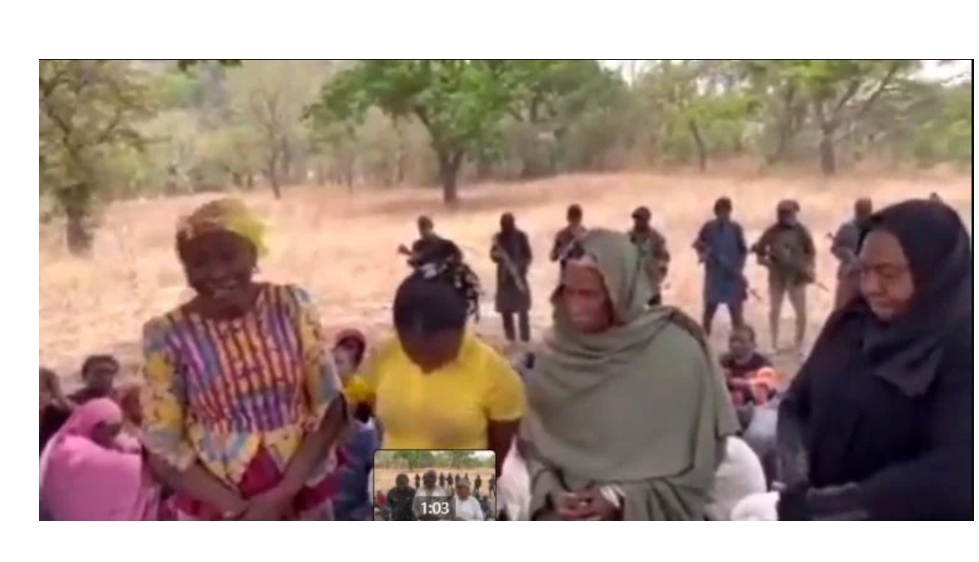Metro
Lady Abduct, Murder Corper to Snatch Her Boyfriend

The Federal Capital Territory Commissioner of Police, Sunday Babaji, has said the late 26-year-old National Youth Service Corps member, Terungwa Stephanie, was allegedly killed from exposure to a corrosive substance.
The commissioner disclosed this while parading three suspects in connection to her death at the FCT Police Command on Monday in Abuja.
The suspects are: Jenifer Tsembe ‘f’, 26, Monday Simon (a.k.a Black) ‘m’, 36, and Solomon Abu ‘m’, 35.
Babaji revealed that the suspects conspired to kidnap the victim in order for Jennifer to have her alleged lover, one Edward Achadu, all to herself.
He said, “Our investigation revealed that the suspects criminally conspired and murdered the victim to separate her from Edward Achadu so that Jennifer Tsembe, one of the suspects and an estranged lover of Edward, could have him all to herself, especially for pecuniary benefits.
Tsembe told The PUNCH that she only conspired to abduct Jennifer and demand ransom from Achadu, but had no intention to kill her.
She also alleged that one of the other male suspects, Solomon, initiated the plan of the abduction.
However, the other suspects confessed that Tsembe, who is friends with the deceased, had conceived the plan for the deceased to come to her house where she requested their help to tie her upon her arrival. They alleged that after they had played their part, Tsembe instructed them to go away leaving the suspect, deceased and her child behind.
Simon said after he left, Tsembe had called him to say she needed help with the body because the deceased had died. Black, however, alleged that the suspect had already bathed her with acid by the time he arrived at the scene.
The Police commissioner, thereafter, said the Command had intensified investigation to reveal facts that could lead to further arrests of any other fleeing participant(s) in the criminal act.
He said, “The suspects will be charged to court. The command has intensified investigation to reveal facts that could lead to the arrest of any other fleeing participant(s) in the criminal act.
Terungwa Stephanie went missing after she reportedly left home with her one year plus five-months-old son on April 14, 2022, and never returned. Her son was later recovered at the Holy Trinity Catholic Church upon a call placed through to one of the paternal relatives a day after.
The Punch
Metro
Kidnapped Kebbi School Girls Regain Freedom

The 24 schoolgirls abducted from Government Girls Secondary School, Maga, Kebbi state, have been rescued.
Details of the efforts that led to the rescue of the students are still sketchy at the time of this report, but an official announcement is expected tonight, according to TheCable report.
On November 17, bandits attacked the school and abducted 25 female students after killing an official and injuring a security guard.
According to a BBC report, two of the girls escaped from their captors. Quoting Hussaini Aliyu, an official from Danko Wasagu LGA, the BBC reported that the two students ran away as they were being led into the bushes by the bandits and escaped across farmland.
On November 19, Hussaini Aliyu, chairman of Danko/Wasagu LGA in Kebbi, released names of the 25 abducted schoolgirls.
The list of the kidnapped students, seen by TheCable, is organised according to their class categories.
After the incident, Bello Sani, commissioner of police in Kebbi, said additional police tactical units, alongside military personnel and vigilante groups, have been deployed in the area.
Waidi Shaibu, chief of army staff (COAS), also directed troops of Operation FANSAN YANMA to leave no stone unturned in the ongoing search-and-rescue operation for the abducted students.
President Bola Tinubu also directed Bello Matawalle, minister of state for defence, to relocate to Kebbi over the abduction of schoolgirls.
Tinubu ordered Matawalle to move to the state “to monitor security efforts to secure the release of the abducted students”.
Metro
Kwara Gov Announces Release of 38 Abducted Worshippers

Kwara State governor, AbdulRahman AbdulRazaq, has announced the release of the 38 worshippers who were abducted by bandits from the Christ Apostolic Church, Eruku.
The victims, who were kidnapped during a recent attack on the church, regained their freedom on Sunday after days of what the governor described as intense collaboration among security agencies and government authorities.
Governor AbdulRazaq attributed the successful rescue operation to what he called President Bola Tinubu’s “hands-on approach,” saying the President personally led efforts to secure the release of the abducted persons.
He disclosed that President Tinubu cancelled his scheduled trip to the G20 meeting in South Africa to focus on security breaches in Kwara and Kebbi states, adding that the President also ordered increased security deployments to the affected areas.
The Governor extended appreciation to the Office of the National Security Adviser, the Department of State Services, the Nigerian Army, the Nigeria Intelligence Agency, and the Nigeria Police Force, which recently deployed four additional tactical teams to Kwara on the President’s directive.
He also thanked security operatives, community leaders, religious bodies, and residents of Kwara State for their support throughout the ordeal.
The Christian Association of Nigeria (CAN) has strongly condemned the violent attack on Christ Apostolic Church in Eruku town, Ekiti Local Government Area of Kwara State, describing the incident as both “heartbreaking and sad.”
The attack, which occurred during a prayer service, reportedly left some worshippers dead and an unspecified number abducted, shocking the Christian community and highlighting persistent insecurity in vulnerable regions.
Metro
The Nigerian Leadership Imperative: A Strategic Framework for National Transformation

By Tolulope A. Adegoke, PhD
“The transformation of Nigeria hinges not on a single leader, but on a reformed system that cultivates servant leadership, institutional integrity, and strategic foresight across all sectors” – Tolulope A. Adegoke, PhD
Preamble
Nigeria’s potential is constrained not by a lack of resources, but by a deficit of transformative leadership. To unlock the possibilities for its people, corporations, and the nation, a systemic overhaul is required. Dr. Adegoke presents an original, comprehensive framework designed to cultivate a new leadership paradigm across all sectors. The proposed model is built on the pillars of ethical governance, institutional integrity, strategic competency, and a culture of servant leadership, aligning Nigerian outcomes with global benchmarks for sustainable development.
1. The Core Philosophy: Redefining Leadership for Nigeria
The prevailing leadership model, often characterized by transactional and authoritarian tendencies, must be deliberately supplanted. The new ethos must be rooted in two complementary paradigms:
· Servant Leadership: Positioning leaders as enablers and stewards whose primary mandate is to empower citizens and employees, remove systemic obstacles, and foster an environment for collective flourishing.
· Transformational Leadership: Demanding leaders who can articulate and inspire commitment to a unifying national vision—one that transcends parochial interests and mobilizes human capital towards shared prosperity.
· Stakeholder Value Orientation: For the corporate sector, this necessitates a shift from narrow shareholder primacy to a broader commitment to creating value for all stakeholders—employees, customers, communities, and the environment—in alignment with international Environmental, Social, and Governance (ESG) principles.
2. A Multi-Sectoral Framework for Action
Sustainable progress requires synchronized leadership excellence across public, private, and civic spheres.
Tier 1: Public Sector & Governance Reformation
The public sector sets the foundational tone and must be the primary focus of reform.
A. Institutional Fortification:
· Meritocratic Appointments: Establish transparent, competitive recruitment processes for all significant public offices (Ministers, Agency Heads, Ambassadors), with publicly disclosed competency criteria to eliminate patronage.
· Guaranteed Autonomy: Legislate and enforce the operational and financial independence of critical institutions—the Judiciary, anti-corruption bodies (EFCC, ICPC), the electoral commission (INEC), and the Central Bank (CBN). Leadership appointments must be based on non-partisan expertise.
· Digital-First Governance: Accelerate the implementation of a robust national digital identity system and integrate all citizen-facing services onto centralized, interoperable platforms to enhance efficiency, transparency, and accountability.
B. Performance and Accountability Infrastructure:
· Mandatory KPIs for Public Officials: Link the tenure and remuneration of cabinet members, governors, and agency heads to the achievement of Specific, Measurable, Achievable, Relevant, and Time-bound (SMART) objectives, directly tied to national development goals like the Sustainable Development Goals (SDGs).
· Radical Transparency: Mandate real-time public disclosure of government budgets, contracts, and project trackers through open-data portals to empower citizen oversight and deter malfeasance.
C. Justice and Security Sector Modernization:
· Leadership Accountability: Invest in continuous, world-class training for judicial and security leadership in modern jurisprudence, human rights, and strategic management. Hold leaders directly accountable for the ethical conduct of their institutions.
Tier 2: Corporate Sector & Economic Leadership
The private sector must evolve from navigating a challenging environment to actively shaping a competitive one.
A. Mainstreaming Global Best Practices:
· Mandatory ESG Integration: Enforce comprehensive ESG reporting as a listing requirement on the Nigerian Exchange (NGX) to align with global capital markets, attract sustainable investment, and demonstrate corporate responsibility.
· Robust Corporate Governance: Strengthen the enforcement of the Nigerian Code of Corporate Governance, ensuring board compositions reflect diversity, independence, and strategic expertise for effective oversight.
B. Cultivating Ethical Innovation:
· The Ethical Tone from the Top: CEOs and board chairs must be the chief advocates for organizational integrity, implementing zero-tolerance policies for corruption and fostering a culture of compliance.
· Strategic Investment in Human Capital: Corporate strategy must prioritize significant investment in research & development (R&D) and continuous talent development to build a globally competitive Nigerian workforce.
C. Constructive Collaboration:
· Strategic Public-Private Partnerships (PPPs): Corporate leaders should engage government as proactive partners in co-designing critical infrastructure and policy frameworks.
· Industry-Wide Standards: Form influential industry consortia to drive self-regulation, establish high operational standards, and advocate for sector-wide policies that enhance national competitiveness.
Tier 3: Civic & Grassroots Leadership Activation
Unleashing the potential of the Nigerian people is the ultimate objective.
A. Educational System Transformation:
· Curriculum Modernization: Overhaul the national educational curriculum to embed critical thinking, digital literacy, ethical reasoning, and entrepreneurial skills from foundational to tertiary levels.
· Reforming the NYSC: Re-engineer the National Youth Service Corps into a premier leadership academy, focusing on practical community development, entrepreneurship, and fostering genuine national cohesion.
B. Empowering Civil Society:
· Amplifying Grassroots Voices: Create protected platforms and provide resources for community organizers, social entrepreneurs, and civic activists who are catalysts for local development.
· A Free and Responsible Media: Support a robust, independent media sector that acts as a societal watchdog, upholding the highest standards of investigative journalism and ethical reporting.
3. Foundational Enablers for Systemic Change
These competencies are essential for the framework’s success across all sectors:
· Evidence-Based Decision-Making: Transition all strategic planning from intuition to rigorous data analytics.
· Strategic Foresight: Institutionalize long-term horizon scanning and scenario planning within government and corporate strategy units.
· Emotional Intelligence & Inclusive Dialogue: Cultivate leadership capable of managing complex social dynamics, fostering inclusivity, and healing national fault lines.
4. Implementation Pathway & Metrics for Success
Phase 1: Catalyzation (Years 0-2)
· Launch a high-impact national leadership and ethics initiative.
· Enact and implement robust electoral reforms to guarantee credible elections.
· Legislate mandatory ESG reporting for all NGX-listed firms.
Phase 2: Institutionalization (Years 3-5)
· Achieve full digitization of core government services and financial management systems.
· Establish a world-class, independent National Institute of Strategic Leadership.
· Fully operationalize the performance-based KPI system for all federal leadership positions.
Phase 3: Global Integration (Years 6-10+)
· Nigeria emerges as a regional leader in governance and corporate integrity.
· Demonstrate measurable, sharp improvements in global indices: Transparency International’s Corruption Perception Index, the World Bank’s Ease of Doing Business, and the UN Human Development Index.
Conclusion: The Call to Build a Legacy
The gap between Nigeria’s potential and its reality can only be bridged by a deliberate and courageous commitment to leadership transformation. This framework provides a structured, actionable pathway. It demands a collective break from the past and an unwavering dedication to a future where Nigerian leadership is synonymous with service, integrity, and excellence. The responsibility to choose this path rests with the current generation of leaders across every sphere of national life.
Dr. Tolulope A. Adegoke, AMBP-UN is a Doctor of Philosophy (PhD) in History and International Studies, Fellow Certified Management Consultant & Specialist, Fellow Certified Human Resource Management Professional, a Recipient of the Nigerian Role Models Award (2024), and a Distinguished Ambassador For World Peace (AMBP-UN). He has also gained inclusion in the prestigious compendium, “Nigeria @65: Leaders of Distinction.”






